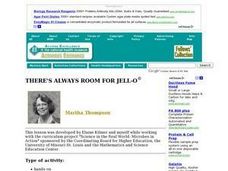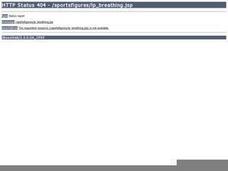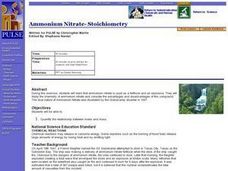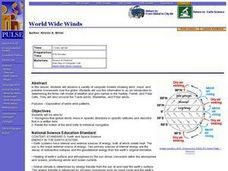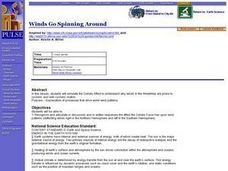Curated OER
There's Always Room For Jell-O
Young scholars explore the breakdown of proteins. They cut wells in Jell-O and observe as the detergent digests the Jell-O. Students record their observations and take measurements.
Curated OER
Breathing Victory
Learners discuss anaerobic respiration and how it relates to sprinting. After discussion of related processes, students create a brochure that explains the complex processes behind every muscular interaction.
Curated OER
Changing Your View
In this refraction worksheet, students will explore the property of light called refraction. Students will conduct a quick experiment to understand how light is refracted. Then students will complete 2 short answer questions.
Curated OER
Ethyl Alcohol
In this ethyl alcohol learning exercise, students read about the characteristics of ethanol including the effects it has on the body when ingested and digested. This learning exercise has 2 short answer questions.
Curated OER
Keeping a Balance
In this cell fluid balance worksheet, students read about how fluids are transported in and out of a cell through the cellular membrane. Students compare cells that are isotonic, hypertonic, and hypotonic. This worksheet has 3 matching...
Curated OER
Stoichiometry
In this stoichiometry worksheet, students identify types of reactions, show the products, and balance the equations. Students determine the limiting reagent, theoretical yield, and percent yield for given reactions. This worksheet has 5...
Curated OER
How Diverse is That?
Students study the concepts of "variety" and "relative abundance" as they relate to biological diversity. In this life science activity students calculate numbers that describe the biological diversity in certain communities.
Curated OER
Ten Multiple-Choice Rate, Ratio, and Proportion Problems
In this rate, ratio, and proportion worksheet, 7th graders solve ten multiple-choice problems. The solutions are provided by clicking on the "show answers" on the bottom of the page.
Curated OER
What's the Big Deal?
Young scholars define terms and describe where they are found and formed. In this methane lesson students complete an activity and describe ways in which methane hydrates impact our lives.
Curated OER
Sea State
Students explain the process of wave formation and analyze the relationship between the ocean and the atmosphere. In this oceans lesson students use buoys to cast real time sea state conditions.
Curated OER
Corrosion & Rust
Students examine how and when rust and corrosion occur. In this corrosion lesson students complete an experiment to see why metals rust.
Curated OER
Substances And Chemical Reactions
Students watch and predict chemical reactions when different substances are mixed together. They differentiate between solid, liquid, and gas.
Curated OER
DNA: What Does It Mean?
Tenth graders explore DNA using online tutorial. They perform their own DNA extraction from a clove of garlic and identify the key components of DNA.
Curated OER
How to Read a Thermometer
Students' temperature is measured using an instrument called a thermometer.
Curated OER
Candy Cane Chemistry
Fourth graders, in groups, examine the effect of heat on bonding forces by doing laboratory work.
Curated OER
What Is an Egg Without its Shell?
Students observe osmosis, a cellular process that normally can't be observed without a microscope, and use scientific method to observe osmosis in a chicken egg.
Curated OER
What Is the Freezing Point?
Students remove heat energy and determine how it causes a phase change.
Curated OER
Let the Sunshine in
Students collect and analyze data to study wavelengths of visible light. They cover Styrofoam cups with three different colors of sun filtering products and shine a lamp directly on the cups. They determine the most effective filtering...
Curated OER
How do plant & animal cells make and use energy?
Students show the relationship between the need for plants to undergo photosynthesis in order to generate oxygen. They see the flaws associated with this thinking because of the lack of CO2 and H2O and lack of sufficient gravity in order...
Curated OER
Toxicology and Living Systems
Learners investigate how toxic chemicals affect biological systems. They determine the toxic dose of a chemical that inhibits seed germination in a Brassica rapa. They investigate the effect of environmental tobacco smoke on human lung...
Curated OER
The Nitrogen Cycle
Fifth graders investigate the nitrogen cycle and examine the concepts of decomposition and nitrification. Students participate in a class discussion about the creation of waste and ammonia compounds, then using nitrogen cycle cut-outs...
Curated OER
Ammonium Nitrate- Stoichiometry
Students quantify the relationship between moles and mass. They comprehend that ammonium nitrate is used as a fertilizer and an explosive. Students study the chemistry of ammonium nitrate and consider the advantages and disadvantages of...
Curated OER
World Wide Winds
Students recognize that global winds move in specific directions in specific latitudes and describe that in a written form. They relate the motion of the wind belts to historical navigation.
Curated OER
Winds Go Spinning Around
Students simulate the Coriolis Effect to comprehend why winds in the Westerlies are prone to cyclonic and anti-cyclonic motion. They arrive at an explanation of processes that drive world wind patterns
Other popular searches
- Polar Water Molecules
- Water Molecules Models
- Constructing Water Molecules
- Matter and Molecules Water
- Water Molecules Definitions


